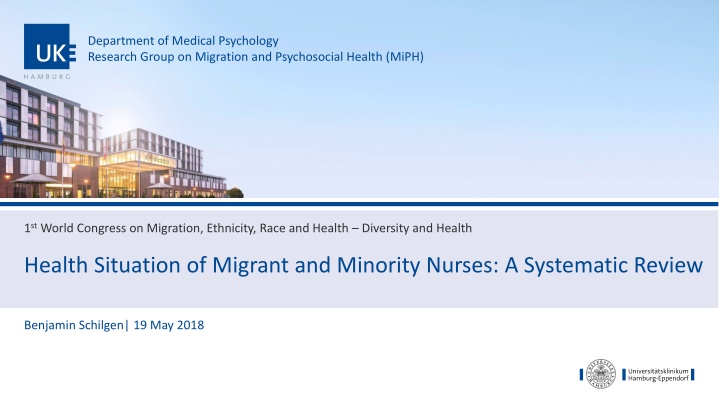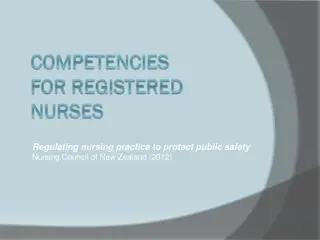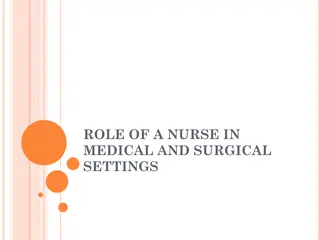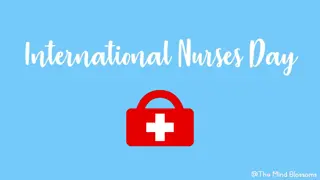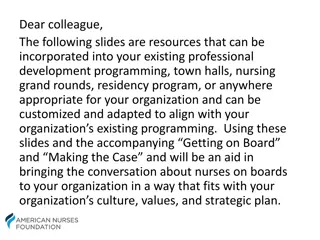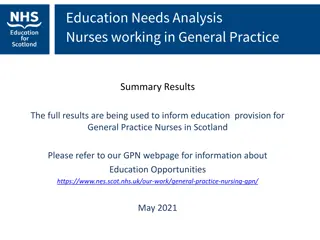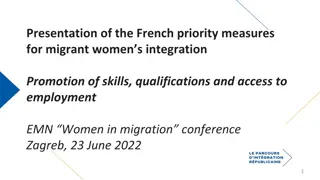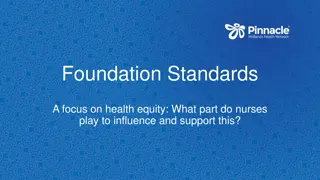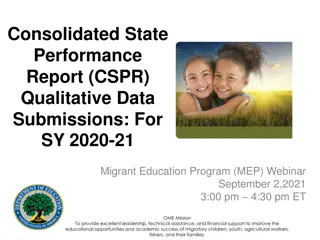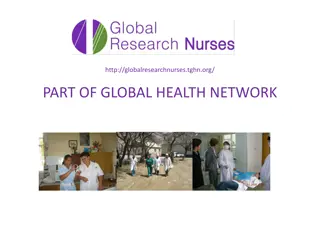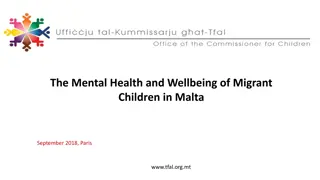Health Situation of Migrant and Minority Nurses: A Systematic Review
This systematic review examines the working situation, barriers, resources, and research gaps pertaining to the health of migrant and minority nurses, focusing on their experiences in healthcare settings.
Download Presentation

Please find below an Image/Link to download the presentation.
The content on the website is provided AS IS for your information and personal use only. It may not be sold, licensed, or shared on other websites without obtaining consent from the author.If you encounter any issues during the download, it is possible that the publisher has removed the file from their server.
You are allowed to download the files provided on this website for personal or commercial use, subject to the condition that they are used lawfully. All files are the property of their respective owners.
The content on the website is provided AS IS for your information and personal use only. It may not be sold, licensed, or shared on other websites without obtaining consent from the author.
E N D
Presentation Transcript
Department of Medical Psychology Research Group on Migration and Psychosocial Health (MiPH) 1stWorld Congress on Migration, Ethnicity, Race and Health Diversity and Health Health Situation of Migrant and Minority Nurses: A Systematic Review Benjamin Schilgen| 19 May 2018
Benjamin Schilgen Health Situation of Migrant and Minority Nurses: A Systematic Review 2 Research Group on Migration and Psychosocial Health (MiPH) www.uke.de/miph UKE, 2017 Current research activities Multilingualism in healthcare Intercultural healthcare research Intercultural competence of staff members Intercultural opening of the healthcare system Cultural and linguistic sensitivity interventions and instruments Relationship between migration/refugee status and health/resilience
Benjamin Schilgen Health Situation of Migrant and Minority Nurses: A Systematic Review 3 Agenda 1. Background 2. Methods 3. Results 4. Conclusion
Benjamin Schilgen Health Situation of Migrant and Minority Nurses: A Systematic Review 4 Working Situation of Migrant and Minority Nurses Barriers Non-recognition of the nurse s qualification (Afentakis, 2014; Taylor, 2005) Reports of discrimination (Neiterman and Bourgeault, 2015) Diverging understanding of cultural values and language (Levitt, 2014) Resources Feeling solidarity with other migrant colleagues (Neiterman and Bourgeault, 2012) Feeling appreciation of their linguistic competence (Omeri and Atkins, 2002) Increased intercultural sensitivity towards autochthonous nurses (Friebe, 2006) no systematic review with focus on the health of migrant and minority nurses
Benjamin Schilgen Health Situation of Migrant and Minority Nurses: A Systematic Review 5 Research Question What do we know about the health of Migrant and Minority Nurses?
Benjamin Schilgen Health Situation of Migrant and Minority Nurses: A Systematic Review 6 Study Selection PRISMA Flowchart (Moher et al., 2009)
Benjamin Schilgen Health Situation of Migrant and Minority Nurses: A Systematic Review 7 Study Characteristics Countries of study USA, Canada, Denmark, United Kingdom, Israel, Yemen Migrated from Europe, Africa, Philippines, India, Former Soviet Union, Israel, Mexico Methodological quality of studies 8 studies moderately strong/ strong, 6 studies weak according to MMAT Major pitfalls Convenience sampling Application of self-developed and non-validated study instruments Low response rate Many psychological instruments inappropriate to be applied to minority groups
Benjamin Schilgen Health Situation of Migrant and Minority Nurses: A Systematic Review 8 Theme 1: Acculturation and Health Duration of residence in the US correlates positively with arterial blood pressure among Filipina nurses (Brown and James, 2000) Duration of residency in Israel correlates negatively with the level of depression (Hener, Weller et al., 1997) Role confusion and a high workload lead to stress among nurses from the Philippines in the US (Hayne, Gerhardt et al., 2009)
Benjamin Schilgen Health Situation of Migrant and Minority Nurses: A Systematic Review 9 Theme 2: Health in the Context of Discrimination and Bullying in the Workplace Risk of being bullied twice as high for migrant nurses from Eastern Europe and Asia as compared to autochthonous nurses in Denmark (Hogh et al., 2011) Lower salary among nurses who were recruited by agencies (Pittman et al., 2014) Ignoring Sub-Saharan African nurses professional work-related experience and knowledge working in the United Kingdom (Likupe and Archibong, 2013)
Benjamin Schilgen Health Situation of Migrant and Minority Nurses: A Systematic Review 10 Theme 3: Health in the Context of Race and Ethnic Origin European nurses report stress and physical strains rather than Filipino nurses do in the US (Brown, James et al., 2003) Indian nurses in Yemen were absent from work due to back pain half as frequent as their native colleagues from Yemen (Ghilan et al., 2013) African-American nurses working in the US were more likely to report a work-related injury than Whites did o Among the occupations in hospital with frequent risk of injuries, African-American and White nurse s aides did not differ in having suffered an injury (Simpson and Severson, 2000)
Benjamin Schilgen Health Situation of Migrant and Minority Nurses: A Systematic Review 11 Conclusion Insufficient number and quality of studies about health situation of Migrant and Minority nurses Incongruent findings concerning reported health of Migrant nurses over time Migrant and Native nurses tend to differ in their physiological response to stress and in the extent to report work-related injuries Migrant and Minority nurses seem to be at a higher risk for work-related injuries than Native or Majority nurses Discrimination seems to be a leading cause for impaired health amongst Migrant and Minority nurses Need for careful conclusions about the health of migrant nurses Schilgen B, Nienhaus A, Handtke O, Schulz H, M sko M, Health situation of migrant and minority nurses: A systematic review, PLOS ONE. 2017;12(6):e0179183.
Benjamin Schilgen Health Situation of Migrant and Minority Nurses: A Systematic Review 12 Outlook What is needed? Representative cohort Language- and culture-sensitive surveys Longitudinal studies
Benjamin Schilgen Health Situation of Migrant and Minority Nurses: A Systematic Review 13 Afentakis A, Maier T. K nnen Pflegekr fte aus dem Ausland den wachsenden Pflegebedarf decken? Analysen zur Arbeitsmigration in Pflegeberufen im Jahr 2010. 2014. In: Statistisches Bundesamt, editor. Wirtschaft und Statistik, pp. 173-82. Hogh A, Carneiro IG, Giver H, Rugulies R. Are immigrants in the nursing industry at increased risk of bullying at work? A one-year follow-up study. Scandinavian journal of psychology. 2011;52(1):49-56. http://dx.doi.org/10.1111/j.1467-9450.2010.00840.x. References Brown DE, James GD. Physiological stress responses in Filipino- American immigrant nurses: the effects of residence time, life-style, and job strain. Psychosomatic medicine. 2000;62(3):394-400. https://www.ncbi.nlm.nih.gov/pubmed/10845353. Levitt S.R. Cultural Factors Affecting International Teamwork Dynamics. The International Journal of Knowledge, Culture, and Change in Organizations: Annual Review. Volume 13, 2014. The University of Texas at San Antonio, USA. Brown DE, James GD, Nordloh L, Jones AA. Job strain and physiological stress responses in nurses and nurse's aides: predictors of daily blood pressure variability. Blood pressure monitoring. 2003;8(6):237-42. https://www.ncbi.nlm.nih.gov/pubmed/14688553. Likupe G, Archibong U. Black African Nurses' Experiences of Equality, Racism, and Discrimination in the National Health Service. Journal of Psychological Issues in Organizational Culture. 2013;3(S1):227-46. http://dx.doi.org/10.1002/jpoc.21071. Friebe J. Migrantinnen und Migranten in der Altenpflege. Bestandsaufnahme, Personalgewinnung und Qualifizierungen in Nordrhein-Westfalen Eine Handreichung f r Bildung und Praxis in der Altenpflege. 2006. Bonn. Deutsches Institut f r Erwachsenenbildung. LokayDruck, Reinheim. Neiterman E, Bourgeault IL. The shield of professional status: Comparing internationally educated nurses' and international medical graduates' experiences of discrimination. Health (London). 2015 Nov;19(6):615-34. doi: 10.1177/1363459314567788. Omeri A, Atkins K. Lived experiences of immigrant nurses in New South Wales, Australia: searching for meaning. International Journal of Nursing Studies. 2002 Jul;39(5):495-505. https://doi.org/10.1016/S0020-7489(01)00054-2. Ghilan K, Al-Taiar A, Yousfi NA, Zubaidi RA, Awadh I, Al-Obeyed Z. Low back pain among female nurses in Yemen. International journal of occupational medicine and environmental health. 2013;26(4):605-14. http://dx.doi.org/10.2478/s13382-013-0124-0. Pittman P, Davis C, Shaffer F, Herrera CN, Bennett C. Perceptions of employment-based discrimination among newly arrived foreign- educated nurses. The American journal of nursing. 2014;114(1):26-35. https://dx.doi.org/10.1097/01.NAJ.0000441792.93279.29. Hayne AN, Gerhardt C, Davis J. Filipino nurses in the United States: recruitment, retention, occupational stress, and job satisfaction. Journal of transcultural nursing : official journal of the Transcultural Nursing Society / Transcultural Nursing Society. 2009;20(3):313-22. http://dx.doi.org/10.1177/1043659609334927. Simpson CL, Severson RK. Risk of injury in African American hospital workers. Journal of occupational and environmental medicine / American College of Occupational and Environmental Medicine. 2000;42(10):1035-40. https://www.ncbi.nlm.nih.gov/pubmed/11039167. Hener T, Weller A, Shor R. Stages of acculturation as reflected by depression reduction in immigrant nursing students. The International journal of social psychiatry. 1997;43(4):247-56. http://dx.doi.org/10.1177/002076409704300402. Taylor R. Addressing barriers to cultural competence. Journal For Nurses in Staff Development. 2005 Jul-Aug;21(4):135-42.
Department of Medical Psychology Research Group on Migration and Psychosocial Health (MiPH) Martinistra e 52 | D-20246 Hamburg Benjamin Schilgen Research Associate Phone Fax +49 (0) 40 7410-57200 +49 (0) 40 7410-58500 b.schilgen@uke.de | www.uke.de/agpm
